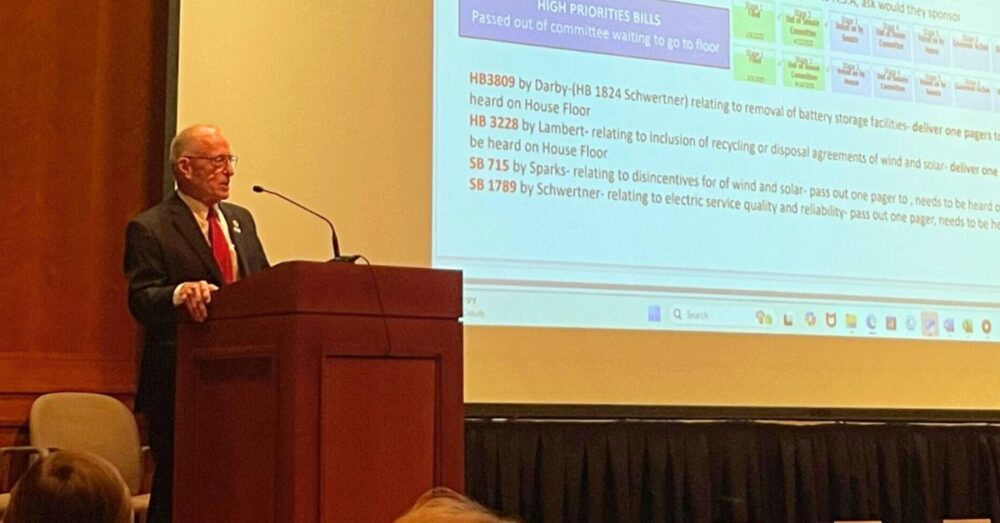Nearly every speaker and attendee at Monday’s “Secure The Grid” event at the Texas Capitol rallied against Battery Energy Storage Systems (BESS).
Event organizer and activist Nancy White led the chorus against BESS. “Batteries are the biggest downfall [of the power grid and are expensive supplement]… to fill in for the failures of solar and wind,” she said to The Dallas Express.
Senator Hall also spoke to The Dallas Express and didn’t hold back in his critique of BESS. “It would be a serious mistake to solve grid issues with BESS,” he said. Hall also argued that the programs would collapse if federal subsidies to BESS were removed.
Some figures who spoke to The Dallas Express repeatedly expressed concerns that BESS sites are being installed in vulnerable areas—often in rural communities ill-equipped to handle a hazardous emergency.
Austin County Judge and Fire Chief Tim Lapham raised the alarm about a new BESS facility straddling his county’s border.
“We can’t open the back door of the prison and say, ‘Run Forrest, run,’ because we have to know where Forrest runs to,” Lapham said, referring to the safety of inmates and nursing home residents nearby.
Daniel Hunt, a member of the State Republican Executive Committee, noted that BESS facilities are often placed in fire-prone regions like Texas’ timberlands and grasslands. He warned that a hailstorm or tornado could trigger a fire that rapidly spreads during Texas’ dry summer months, June through September.
James Matlock, a former Marine and current candidate for Texas Railroad Commissioner, said that China controls much of the material supply chain for BESS systems. He recalled that Camp Lejeune had to remove its BESS installations during the Biden administration over national security concerns. “Texas has a thirst for energy,” Matlock said, adding that oil and natural gas are superior to storing renewable energy in batteries.
There are several BESS developers in Texas, including ENGIE. One entry on ENGIE’s website states BESS facilities are important for saving money:
Battery Energy Storage Systems allow you to engage in energy arbitrage. With BESS, you buy your energy during off-peak hours when grid prices are lowest, store it, and use it during peak hours. When coupled with on-site wind or solar power plants, BESS enable you to maximize the value of the electricity produced from such renewable sources, contributing to a certain extent to reducing the cost of energy both at the wholesale level and hence reflecting it on electricity bills.
Another entry says that BESS can promote power grid stability:
Battery Energy Storage Systems, also called BESS, is a technological solution that helps to balance the electricity grid in real time. Electricity flows on the grid may fluctuate due to various reasons, such as weather, power station outages, congestion on the grid, or geopolitical reasons,” the website states. “Intelligent Battery Energy Storage Systems can complement the grid by providing a continuous power flow, making them a key pillar of your business energy strategy.
Aside from BESS, Secure The Grid also allowed lawmakers to discuss other important power grid issues.
Sen. Bob Hall warned The Dallas Express that foreign adversaries and new technologies threaten Texas’ power infrastructure. “North Korea, China, and Iran have voiced their intent to have a preemptive strike on our power grid,” Hall said. He cited historical examples like the 1962 Starfish Prime nuclear test. That high-altitude detonation over the Pacific disrupted electrical systems nearly 900 miles away in Hawaii, demonstrating how an electromagnetic pulse (EMP) could cripple modern grids.
Hall also referenced the Carrington Event—a massive solar storm in 1859 that knocked out telegraph systems across the U.S.—as a natural analog to potential future threats. “Anyone with a small nuclear weapon off the coast of Texas near a place like Galveston could wreak havoc on Texas’ power grid,” he explained.
He pointed to a White House report on EMP threats, which indicated that 11 months without electricity could result in a 90% decrease in the U.S. population. “Without power, water doesn’t pump, gas doesn’t pump, homes can’t heat, and food can’t store,” Hall said.
At another point during the event, lawmakers had an opportunity to discuss proposed legislation they believe would help shield Texas’ grid from internal and external threats. Sen. Kevin Sparks promoted SB 714, which he said would “firm” the grid.
“This bill is the right thing for the state of Texas,” Sparks explained. The legislation is intended to neutralize price distortions in the ERCOT power region caused by federal tax credits under U.S. Code Section 45.
The bill text states its purpose is “to eliminate or compensate for any distortion in electricity pricing in the ERCOT power region caused by a federal tax credit provided under 26 U.S.C. Section 45.”
Sen. Hall also touted his bill SB 1978, which aims to limit Texas’ electric grid from being linked to systems outside the state. According to the bill, “A person, including an electric cooperative or a municipally owned utility, may not take an action that would result in the interconnection of a facility in the ERCOT power region to a facility located wholly or partly outside of this state, or the interconnection of a facility in the ERCOT power region to a facility that is connected directly or indirectly with a facility located wholly or partly outside of this state.”


